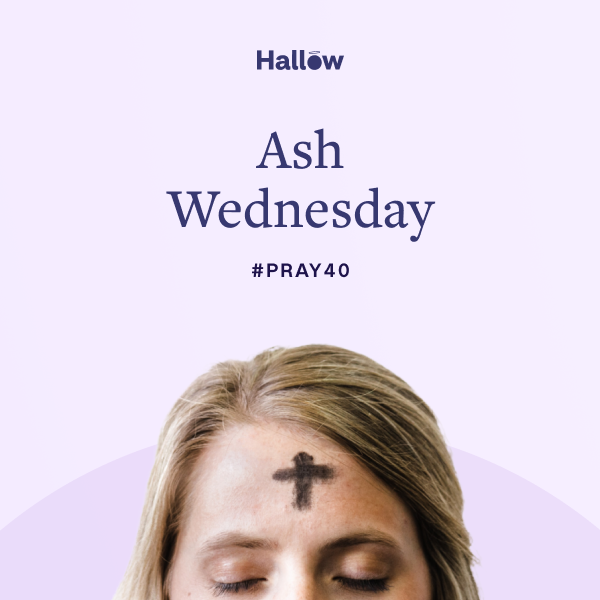
Blog
WP_Post Object
(
[ID] => 2117
[post_author] => 11
[post_date] => 2020-01-09 00:22:19
[post_date_gmt] => 2020-01-09 00:22:19
[post_content] => <!-- wp:paragraph {"className":""} -->
<p class=""><strong><em>9 min read</em></strong></p>
<!-- /wp:paragraph -->
<!-- wp:paragraph {"className":""} -->
<p class="">When Netflix announced the release of <em>The Two Popes</em>, I had already decided I would watch the film, despite the varying reviews that might have normally averted me. It was about the Vatican, the Papacy, and the Catholic faith and it was creating Hollywood buzz, so I wanted to partake in the public discussion. In short, <em>The Two Popes</em> is a story loosely based on true events illustrating a series of fictional encounters between Pope Benedict XVI (now Emeritus) and Cardinal Jorge Bergoglio (now Pope Francis). Since watching the entire movie and re-watching certain significant dialogues, I’ve read both positive praises and negative critiques of the film; overall, the positive praises applaud the script for portraying “its adversaries as passionate humans who move us and make us laugh while they’re having at each other in search of common theological ground”<a href="https://www.wsj.com/articles/the-two-popes-review-a-holy-must-see-11574884970">1</a>, while the negative critiques condemn the film as bearing “no resemblance to the real-life men they were supposed to represent.”<a href="https://www.firstthings.com/web-exclusives/2019/12/two-popes-too-many-untruths">2</a> In the positive reviews, entertainment triumphs throughout the light-hearted script and heart-warming finale. In the negative reviews, gross misrepresentations are said to creep into the perception of the audience, who watch as Pope Benedict XVI appears onscreen as an egotistical, power-hungry traditionalist that offers the more liberal and sensitive Cardinal Jorge Bergoglio almost no warmth or courtesy.</p>
<!-- /wp:paragraph -->
<!-- wp:paragraph {"className":""} -->
<p class="">Regardless of my opinions, reservations, and questions on the dramatized plotline, there was one thing the two main characters, the two successors to the Seat of Saint Peter, the two most recent popes disclosed to each other that they had in common: amid their constant philosophical and social jousting, it was refreshing to hear both Pope Benedict XVI and Cardinal Bergoglio confess to each other their trouble with prayer. During the scene at Castel Gandolfo when Pope Benedict XVI invites his soon-to-be successor to the papal summer home, the German pope divulges to the Argentinian cardinal: “You know, the hardest thing is to listen, to hear His voice. God’s voice.” </p>
<!-- /wp:paragraph -->
<!-- wp:paragraph {"className":""} -->
<p class="">Cardinal Bergoglio pauses, then asks, “Sorry, even for a pope?” </p>
<!-- /wp:paragraph -->
<!-- wp:paragraph {"className":""} -->
<p class="">“Perhaps especially for a pope,” responds Pope Benedict XVI.</p>
<!-- /wp:paragraph -->
<!-- wp:paragraph {"className":""} -->
<p class="">Towards the end of the movie, as Cardinal Bergoglio is confessing to Pope Benedict XVI the political compromises he made during Argentina’s “Dirty War” in the 1970s, the scene flashes back to a homily he says during a mass as a young priest after he is extradited by the Jesuit order to a remote village: </p>
<!-- /wp:paragraph -->
<!-- wp:paragraph {"className":""} -->
<p class="">“I had a TV. I liked to watch football. A TV needs an antenna and a signal. Sometimes the signal is bad. We don’t know why, but sometimes it doesn’t work. It’s the same when we pray. Sometimes the signal God sense us is strong and clear. It works fine. One feels the connection… But other days, one can only say, ‘Well, at least I tried.’ But you’ve gotten nothing back.”</p>
<!-- /wp:paragraph -->
<!-- wp:paragraph {"className":""} -->
<p class="">Despite the fictional nature of the film and granted the two popes may have never uttered those exact words, the story offers us the consolation that everyone experiences a similar type of spiritual darkness at some point in their lives. Whether someone is a non-practicing Catholic, a pope, or even a canonized saint, this “bad signal” with God can happen to anyone. Saint Teresa of Calcutta, for example, is seen by many as the embodiment of Christ’s call for us to live in poverty and to help the poorest among us, yet she even lived through long, desperate, hopeless periods of time where she didn’t see God in the work she did. For many years, she wrote a series of letters, preserved by the Vatican for the process of her beatification and later canonization, many of which echoed the same sentiment of spiritual darkness: “I want—and there is no One to answer—no One on whom I can cling—no, No One. Alone. The darkness is so dark—and I am alone.”<a href="https://blog.franciscanmedia.org/franciscan-spirit/mother-teresa-a-saint-who-conquered-darkness">3</a> Her search for a response isn’t unique, and prayer didn’t come any easier to her because she lived the life of a saint.</p>
<!-- /wp:paragraph -->
<!-- wp:paragraph {"className":""} -->
<p class="">“You say, ‘Father, that doesn’t happen to you.’ People believe that for us it’s different, that we have a direct line with God,” continues young Bergoglio in this homily scene. “No, it’s not like that.” </p>
<!-- /wp:paragraph -->
<!-- wp:paragraph {"className":""} -->
<p class="">How often do we also experience this spiritual darkness, this bad connection, this silence from God? Prayer is our method of communication, but there are times where no amount of meditation or focus on Him seems to provide any response or guidance. We’ve all experienced this, no matter our role in the Church, and we are not alone in our seeming isolation. </p>
<!-- /wp:paragraph -->
<!-- wp:paragraph {"className":""} -->
<p class="">Perhaps our faith perseveres despite these dark times because we believe God is still present to us, even if we cannot hear him. As the USCCB beautifully summarizes, </p>
<!-- /wp:paragraph -->
<!-- wp:paragraph {"className":""} -->
<p class="">“God invites us into a relationship with Him that is both personal and communal. He speaks to us through His Son, Jesus Christ, the Word-made-flesh. Prayer is our response to God who is already speaking or, better yet, revealing Himself to us. Therefore, prayer is not merely an exchange of words, but it engages the whole person in a relationship with God the Father, through the Son, and in the Holy Spirit.”<a href="http://www.usccb.org/prayer-and-worship/prayers-and-devotions/prayers/">4</a></p>
<!-- /wp:paragraph -->
<!-- wp:paragraph {"className":""} -->
<p class="">But the Catholic Church doesn’t expect prayer to be as simple as this relationship might seem. The Catechism (which has several awesome sections discussing <a href="http://www.vatican.va/archive/ccc_css/archive/catechism/p4s1c3a2.htm">prayer</a> – I highly recommend a read through them!) tells us, “Prayer is a battle. Against whom? Against ourselves and against the wiles of the tempter who does all he can to turn man away from prayer, away from union with God.”<a href="http://www.vatican.va/archive/ccc_css/archive/catechism/p4s1c3a2.htm">5</a></p>
<!-- /wp:paragraph -->
<!-- wp:paragraph {"className":""} -->
<p class="">Prayer is how we build our essential relationship with God, yet prayer is also a battle. In battle, we are afflicted. St. Paul, in his letter to the Romans, says, “Affliction produces endurance, and endurance, proven character, and proven character, hope, and hope does not disappoint, because the love of God has been poured out into our hearts through the holy Spirit that has been given to us” (Rom 5:3-5). Like other areas in our faith lives, our belief in God’s presence, through prayer, must conquer our temptations to give up and say, “Well, I guess God just isn’t hearing me,” or, “Maybe my petition isn’t important.” I’ve often had bad connections with God. Mother Teresa often had bad connections with God. Even in <em>The Two Popes</em>, both Pope Benedict XVI and Cardinal Bergoglio had bad connections with God. Prayer is a common practice, and often a struggle, that affects each of us, old and young, liberal and conservative, pope and layperson, saint and sinner. No one has a perfect connection with God, but we can offer Him our continued prayer and a humble heart, leaving our thanks and petitions at the feet of his Son, who told us: “Whoever remains in me and I in him will bear much fruit, because without me you can do nothing.”<a href="http://www.usccb.org/bible/john/15">6</a> </p>
<!-- /wp:paragraph -->
<!-- wp:list {"ordered":true,"className":""} -->
<ol class=""><li><a href="https://www.wsj.com/articles/the-two-popes-review-a-holy-must-see-11574884970">https://www.wsj.com/articles/the-two-popes-review-a-holy-must-see-11574884970</a></li><li> https://www.firstthings.com/web-exclusives/2019/12/two-popes-too-many-untruths </li><li> https://blog.franciscanmedia.org/franciscan-spirit/mother-teresa-a-saint-who-conquered-darkness </li><li> http://www.usccb.org/prayer-and-worship/prayers-and-devotions/prayers/ </li><li>http://www.vatican.va/archive/ccc_css/archive/catechism/p4s1c3a2.htm </li><li> http://www.usccb.org/bible/john/15 </li></ol>
<!-- /wp:list -->
<!-- wp:paragraph {"className":""} -->
<p class=""></p>
<!-- /wp:paragraph -->
[post_title] => Connecting with God in "The Two Popes"
[post_excerpt] => What this new movie can teach us about prayer
[post_status] => publish
[comment_status] => closed
[ping_status] => closed
[post_password] =>
[post_name] => connecting-with-god-in-the-two-popes
[to_ping] =>
[pinged] =>
[post_modified] => 2024-02-13 21:10:42
[post_modified_gmt] => 2024-02-13 21:10:42
[post_content_filtered] =>
[post_parent] => 0
[guid] => https://hallow.com/?p=2117
[menu_order] => 0
[post_type] => post
[post_mime_type] =>
[comment_count] => 0
[filter] => raw
)
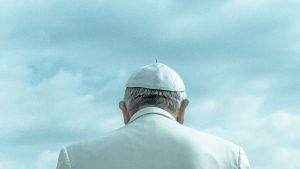
Connecting with God in “The Two Popes”
What this new movie can teach us about prayer
WP_Post Object
(
[ID] => 2030
[post_author] => 4
[post_date] => 2019-12-21 19:20:13
[post_date_gmt] => 2019-12-21 19:20:13
[post_content] => <!-- wp:paragraph -->
<p class="">We want to offer a short prayer for you to pray today. Even if you have to sneak away to do so, we hope this can help you take a breath and spend a few minutes with God.<br></p>
<!-- /wp:paragraph -->
<!-- wp:paragraph -->
<p class="">-<br></p>
<!-- /wp:paragraph -->
<!-- wp:paragraph -->
<p class="">Let’s begin:<br></p>
<!-- /wp:paragraph -->
<!-- wp:paragraph -->
<p class="">Take a few deep breaths. Allow yourself these next few minutes to be here, with God.<br></p>
<!-- /wp:paragraph -->
<!-- wp:paragraph -->
<p class="">A reading from the Gospel of Luke:<br></p>
<!-- /wp:paragraph -->
<!-- wp:paragraph -->
<p class=""><em>And Joseph too went up from Galilee from the town of Nazareth to Judea, to the city of David that is called Bethlehem, because he was of the house and family of David, to be enrolled with Mary, his betrothed, who was with child. While they were there, the time came for her to have her child, and she gave birth to her firstborn son. She wrapped him in swaddling clothes and laid him in a manger, because there was no room for them in the inn.</em><br></p>
<!-- /wp:paragraph -->
<!-- wp:paragraph -->
<p class=""><em>Now there were shepherds in that region living in the fields and keeping the night watch over their flock. The angel of the Lord appeared to them and the glory of the Lord shone around them, and they were struck with great fear.</em><br></p>
<!-- /wp:paragraph -->
<!-- wp:paragraph -->
<p class=""><em>The angel said to them, "Do not be afraid; for behold, I proclaim to you good news of great joy that will be for all the people. For today in the city of David a savior has been born for you who is Christ and Lord. And this will be a sign for you: you will find an infant wrapped in swaddling clothes and lying in a manger."</em><br></p>
<!-- /wp:paragraph -->
<!-- wp:paragraph -->
<p class=""><em>And suddenly there was a multitude of the heavenly host with the angel, praising God and saying: "Glory to God in the highest and on earth peace to those on whom his favor rests."</em><br></p>
<!-- /wp:paragraph -->
<!-- wp:paragraph -->
<p class="">…<br></p>
<!-- /wp:paragraph -->
<!-- wp:paragraph -->
<p class="">Jesus is here. Our prayers of “O come, o come Emmanuel” have been answered. In the midst of whatever this day brings, whether it is great joy or great suffering and anxiety, or a mix of both, God is with us. <br></p>
<!-- /wp:paragraph -->
<!-- wp:paragraph -->
<p class="">Help us, Lord, to feel the wonder of this day. May we stand in awe beside the shepherds as we hear the angels declare the good news. May we kneel beside Mary and Joseph, and imagine both the joy at their sweet son’s birth, and the anxious anticipation: <em>what will happen now? </em>May we gently pick up the baby Jesus and gaze at his face. We know what awaits him, but oh, we are so grateful for a God who became small so that we could be with him. The world can never be the same. We can never be the same. <br></p>
<!-- /wp:paragraph -->
<!-- wp:paragraph -->
<p class="">And as the day goes on, whatever it may bring, may we join our voices with the angels and shout with joy, “Glory to God in the highest!” Jesus has come! <br></p>
<!-- /wp:paragraph -->
<!-- wp:paragraph -->
<p class="">Amen, Alleluia! <br></p>
<!-- /wp:paragraph -->
[post_title] => From all of us at Hallow: Merry Christmas!
[post_excerpt] => A prayer for you
[post_status] => publish
[comment_status] => open
[ping_status] => open
[post_password] =>
[post_name] => from-all-of-us-at-hallow-merry-christmas
[to_ping] =>
[pinged] =>
[post_modified] => 2021-02-05 15:42:43
[post_modified_gmt] => 2021-02-05 15:42:43
[post_content_filtered] =>
[post_parent] => 0
[guid] => https://hallow.com/?p=2030
[menu_order] => 0
[post_type] => post
[post_mime_type] =>
[comment_count] => 0
[filter] => raw
)
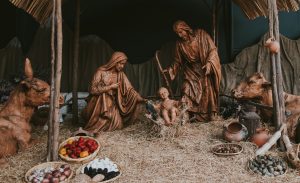
From all of us at Hallow: Merry Christmas!
A prayer for you
WP_Post Object
(
[ID] => 2012
[post_author] => 12
[post_date] => 2019-12-19 00:54:40
[post_date_gmt] => 2019-12-19 00:54:40
[post_content] => <!-- wp:paragraph {"className":""} -->
<p class="">As I attempt to write this article, I’m immediately reminded of how much I struggle with writing. From the whiny cries of second-grade me attempting to develop a story, to attempting to articulate my thoughts in my graduate school education courses, I’ve never had that natural, raw gift of writing. However, I write this piece with ease knowing that my husband, Alex, will open his laptop this Advent and find my posted blog entry. I now find that my fingers cannot move fast enough.<br></p>
<!-- /wp:paragraph -->
<!-- wp:paragraph {"className":""} -->
<p class="">I met Alex at the very beginning of our junior year at Notre Dame. He instantly captured my interest with his quick wit, generous heart, and hard work ethic. As our relationship - and later engagement and marriage - grew, so did our faith life together. <br></p>
<!-- /wp:paragraph -->
<!-- wp:paragraph {"className":""} -->
<p class="">But it wasn’t until he devoted his life to starting and running Hallow that I truly saw our faith life thrive. It was such a focused and transformative experience. The creation of Hallow has strengthened our marriage in two ways:<br></p>
<!-- /wp:paragraph -->
<!-- wp:paragraph {"className":""} -->
<p class=""><strong>1. I rediscovered my own Catholic faith</strong><br></p>
<!-- /wp:paragraph -->
<!-- wp:paragraph {"className":""} -->
<p class="">Growing up, I honestly considered myself somewhat of an expert in Catholicism. I was raised by two devout Catholic parents (one of whom is a Catholic school teacher), went to Catholic school, and knew the basics regarding all things “church” - sacraments, liturgical calendars, songs, and prayers. <br></p>
<!-- /wp:paragraph -->
<!-- wp:paragraph {"className":""} -->
<p class="">However, as Hallow began to take off, I began to see how much I didn’t know about my faith. Yes, I had memorized prayers, but had I ever reflected on their meanings? Yes, I had received the sacraments, but why was that something we Catholics do? And what are these meditations that my husband keeps mentioning?<br></p>
<!-- /wp:paragraph -->
<!-- wp:paragraph {"className":""} -->
<p class="">It was only when I truly asked and discussed honest questions with Alex that I realize how much more room I had to grow in my Catholic faith. I was baffled by how much more there was to Catholicism, from saints I’d never heard of, to attending adoration simply to sit in silence with God. My self-proclaimed expert title began to melt away. <br></p>
<!-- /wp:paragraph -->
<!-- wp:paragraph {"className":""} -->
<p class="">The Hallow praylists challenged me. The guests sessions engaged me. The Lectio Divinas and Examens changed me. I now see my marriage and my husband with so much more love and sacred devotion.<br></p>
<!-- /wp:paragraph -->
<!-- wp:paragraph {"className":""} -->
<p class=""><strong>2</strong>. <strong>I have fallen in love with my husband all over again</strong><br></p>
<!-- /wp:paragraph -->
<!-- wp:paragraph {"className":""} -->
<p class="">I think it’s safe to say that watching the joy of a loved one doing<em> </em>something they love is deeply moving. The same is true for how I feel about Alex. At times, I have peered up from grading my fifth graders’ homework to look over at him. With his laser-focused concentration and hands flying across his keyboard as he works on Hallow, I feel a sense of peace wash over me. I smile to myself as I look to this man who I fell in love with all these years ago. <br></p>
<!-- /wp:paragraph -->
<!-- wp:paragraph {"className":""} -->
<p class="">Alex taught me how we can use the power of prayer in our marriage. We now frequently pray Night Prayer before bed. We discuss our daily highs and lows more openly. We attend daily mass during Advent. We make our marriage a priority. <br></p>
<!-- /wp:paragraph -->
<!-- wp:paragraph {"className":""} -->
<p class="">And I owe it all to God.<br></p>
<!-- /wp:paragraph -->
<!-- wp:paragraph {"className":""} -->
<p class="">Alex, the work you and the Hallow team have done definitely has God smiling down on you. Keep up the great work, and keep changing lives as much as you have changed mine. <br></p>
<!-- /wp:paragraph -->
<!-- wp:paragraph {"className":""} -->
<p class=""><strong>RELATED: </strong><a href="https://hallow.com/collections/390/marriage-novena/">Marriage Novena</a></p>
<!-- /wp:paragraph -->
[post_title] => How Hallow Strengthened my Marriage
[post_excerpt] => A surprise Christmas present to Alex, Hallow's CEO.
[post_status] => publish
[comment_status] => open
[ping_status] => open
[post_password] =>
[post_name] => how-hallow-strengthened-my-marriage
[to_ping] =>
[pinged] =>
[post_modified] => 2025-10-09 14:22:57
[post_modified_gmt] => 2025-10-09 14:22:57
[post_content_filtered] =>
[post_parent] => 0
[guid] => https://hallow.com/?p=2012
[menu_order] => 0
[post_type] => post
[post_mime_type] =>
[comment_count] => 0
[filter] => raw
)
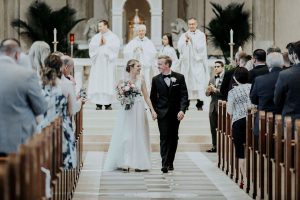
How Hallow Strengthened my Marriage
A surprise Christmas present to Alex, Hallow's CEO.
WP_Post Object
(
[ID] => 1892
[post_author] => 11
[post_date] => 2019-11-26 04:54:25
[post_date_gmt] => 2019-11-26 04:54:25
[post_content] => <!-- wp:paragraph {"className":""} -->
<p class="">As Thanksgiving
approaches, we are surrounded by images and campaigns promoting gratitude. In
2016 around this same season, it was extremely difficult for me to give thanks
to anyone. Neither my family, my friends, nor God were able to provide the one
thing I felt I needed when I was in a serious state of loss and grief. Three
years ago, we lost my father unexpectedly. There was no anticipation of his
passing, no plans for his death, no goodbye, and no one who could bring him
back to me.</p>
<!-- /wp:paragraph -->
<!-- wp:paragraph {"className":""} -->
<p class="">The
day before my dad died, our family and some friends had gathered to watch the
Vikings-Packers game at my then-fiancé’s condo in Minneapolis. My dad was a
tremendous fan of the Green Bay Packers and any time spent watching his
football team with his family was glorious to him. We spent the evening eating,
drinking, laughing, and talking with the guests that had gathered. We FaceTimed
my sister, who was studying in Madrid at the time, and called my aunt, whose
birthday it was on that Sunday. In essence, it was a perfect day for us; it
seemed he was able to speak with every person he loved on his last full day on
earth. </p>
<!-- /wp:paragraph -->
<!-- wp:paragraph {"className":""} -->
<p class="">The
next morning was Monday, September 19, 2016. I was living with my parents at
the time and remember distinctly the last time I saw my dad that morning before
I left for work. I had finished getting ready and ran upstairs to my bedroom to
take my bag to the car. My dad passed me on the staircase dressed in his shirt
and shorts for his daily jog on that beautiful morning. “I love you!” He yelled
as he left the house. “I love you, too!” I responded, and then drove to work.</p>
<!-- /wp:paragraph -->
<!-- wp:paragraph {"className":""} -->
<p class="">The
next hours and days were a blur. On my way to work, I received a panicked call
from my mom that I will never forget. My dad had suffered a massive heart
attack on his run, had been discovered by a stranger walking past his fallen body
on the sidewalk, and was in the ambulance on the way to the hospital. I met her
there in the ER, went into his room, and stood quietly in shock next to his
inanimate body on the hospital bed. I witnessed the medical staff attempt one
last time to resuscitate him. The attempt failed. There was nothing more we
could do. He had died before noon.</p>
<!-- /wp:paragraph -->
<!-- wp:paragraph {"className":""} -->
<p class="">In
the Gospel of Matthew, Jesus tells us, “Stay awake, for you know neither the
day nor the hour.” (Mt 25:13) It’s hard to put into words how ready my dad was
to die at any moment. His entire life was a witness to faith. He was firm in
his beliefs, but charitable in his actions. He supported, taught, and loved me,
my sister, and my mom every day of his life. He received the sacraments
regularly and always strived to act in accordance with the Catholic Church. The
day of his funeral, the church where the mass was held was completely full; the
attendance at the funeral was a testament to the impact he made on the lives of
his friends, coworkers, colleagues, and family.</p>
<!-- /wp:paragraph -->
<!-- wp:paragraph {"className":""} -->
<p class="">But
it took me a long time to realize that my dad had lived a beautiful, virtuous,
dignified, full life. In the weeks and months after his sudden death, I was sometimes
hysterical, sometimes depressed, and sometimes numb. I distinctly recall one
moment about a month after his death where I felt the deepest despair I had
ever experienced. I was crying and shaking uncontrollably in my parent’s living
room with the same recurring thought in my mind: “This is it? He dies and
that’s it? And I’m never going to see him again?” </p>
<!-- /wp:paragraph -->
<!-- wp:paragraph {"className":""} -->
<p class="">My
despair then evolved into a different kind of self-centered misery; I became
enveloped in how anguished the next few stages of my life would be. “I’m only
23 years old and I don’t have a father. I have to walk down the aisle at my
wedding in six months with no one to lead me to the altar. My children will
never know this amazing man whom I was blessed to call my dad...”</p>
<!-- /wp:paragraph -->
<!-- wp:paragraph {"className":""} -->
<p class="">My faith was like a spotlight in this dark time, however, which broke through the obscurity of the pain I was feeling and focused its luminescence on the countless other graces in my life. It was Jesus Christ’s resurrection that allowed me to believe that all this despair I was feeling would be redeemed in Heaven when we are united with God. There is nothing else I could find in this world that would give meaning to this suffering except God, and I clung to that hope to climb out of the darkness again. The idea that helped me most was that Jesus didn’t promise anywhere in the Gospels that this life would be easy or free from difficulties. He actually encourages us to do quite the opposite; if we want eternal happiness in the next life, we must “take up [the] cross.” (Mk 8:34)</p>
<!-- /wp:paragraph -->
<!-- wp:paragraph {"className":""} -->
<p class="">So
I embraced my suffering as Jesus Christ embraced the Holy Cross. Little by
little, I was comforted in knowing that He had shared in the pain with me
during his time on earth and, as time passed, my own wounds began to slowly
heal. The scars remain deep in me, and I know I will never be the same without
my dad on earth with me. But accepting my suffering as something I knew would bring
me closer to Jesus allowed me to also acknowledge the undeniable joys in my life:</p>
<!-- /wp:paragraph -->
<!-- wp:paragraph {"className":""} -->
<p class="">I
was about to get married to the most incredible man I’ve ever met! </p>
<!-- /wp:paragraph -->
<!-- wp:paragraph {"className":""} -->
<p class="">My
whole family and all my friends would be there to celebrate our wedding!</p>
<!-- /wp:paragraph -->
<!-- wp:paragraph {"className":""} -->
<p class="">I
was going on an unforgettable honeymoon to Greece! </p>
<!-- /wp:paragraph -->
<!-- wp:paragraph {"className":""} -->
<p class="">(And
nine months later…) My husband and I were going to be expecting a baby boy!</p>
<!-- /wp:paragraph -->
<!-- wp:paragraph {"className":""} -->
<p class="">When I recognized these
pronounced joys in my life, I became overwhelmingly grateful to God and to my
family for these gifts. How could I remain desperate when so many positive
events were awaiting me? How could I dwell on the death of my father when he
had already given me so much during his time on earth? How could I abandon hope
when I truly believed he was now enjoying the communion of saints and peace in
the afterlife?</p>
<!-- /wp:paragraph -->
<!-- wp:paragraph {"className":""} -->
<p class="">At
the mass of my dad’s funeral, one of the readings was The Beatitudes from the
Gospel of Matthew. The line, “Blessed are they who mourn, for they will be
comforted,” seemed most relevant to me in 2016, but today, although I still
grieve for my dad, it seems the closing line of the reading is where I should
have focused all along: “Rejoice and be glad, for your reward will be great in
heaven.” I have found that now, in addition to every other blessing in my life,
I am grateful for the gift of Heaven and the hope of the Resurrection. My
prayer is that everyone recognizes this gift so that they, too, can rejoice
despite the pain and evil we face in this life on earth.</p>
<!-- /wp:paragraph -->
<!-- wp:paragraph {"className":""} -->
<p class="">I
wish everyone a blessed Thanksgiving Day! May God’s love perforate your every
interaction and may you be filled with the grace of peace.</p>
<!-- /wp:paragraph -->
<!-- wp:paragraph {"className":""} -->
<p class="">God bless,</p>
<!-- /wp:paragraph -->
<!-- wp:paragraph {"className":""} -->
<p class="">Julia</p>
<!-- /wp:paragraph -->
[post_title] => Finding Gratitude after Grief
[post_excerpt] => Julia reflects on the impact of faith after her father's death.
[post_status] => publish
[comment_status] => open
[ping_status] => open
[post_password] =>
[post_name] => finding-gratitude-after-grief
[to_ping] =>
[pinged] =>
[post_modified] => 2020-10-05 17:22:01
[post_modified_gmt] => 2020-10-05 17:22:01
[post_content_filtered] =>
[post_parent] => 0
[guid] => https://hallow.com/?p=1892
[menu_order] => 0
[post_type] => post
[post_mime_type] =>
[comment_count] => 0
[filter] => raw
)

Finding Gratitude after Grief
Julia reflects on the impact of faith after her father's death.
WP_Post Object
(
[ID] => 1813
[post_author] => 6
[post_date] => 2019-11-12 04:56:20
[post_date_gmt] => 2019-11-12 04:56:20
[post_content] => <!-- wp:paragraph {"className":""} -->
<p class="">The last thing I remember was seeing Gina run past me towards the ball and the rest was all a blur. I ran into a patch of mud on the soccer field and simultaneously kicked the ball. The result was me doing an unintentional backflip and crashing on the ground with my left leg. I heard a “pop” when I was in the air and when I came to, I was convinced I had torn my ACL. Thankfully, it was just at a pickup game of soccer with my local <a href="http://frassatinewhaven.org/">Frassati</a> group and they were able to quickly take me off the field. After being taken to the university health center, I was given some crutches and was assured that I had not broken any bones or torn any ligaments. I had, however, torn my left quad, sprained my ankle, and bruised my ego. I had never been on crutches and I was anxious to get back to normal as fast as possible. </p>
<!-- /wp:paragraph -->
<!-- wp:paragraph {"className":""} -->
<p class="">Almost a week later of having been on crutches, the biggest change I’ve noticed (aside from taking twice as long to do literally anything that involves moving) is how much more present I am in the day. I have no choice but to focus on the little things and on the present moment. I have to plan how to go to the bathroom, how to shower, and how to take the trash out. I’ve realized that you have to depend on the kindness of others to open a door, to hold the elevator, and to pick up the pencil you just dropped. Having crutches has made it almost impossible for me to run my day on autopilot and instead has forced me to be present in the moment any time I need to move.</p>
<!-- /wp:paragraph -->
<!-- wp:paragraph {"className":""} -->
<p class="">Most importantly, it made me think of something that Fr. Mike Schmitz says in one of <a href="https://www.youtube.com/watch?v=J7LJuWjCTDw&t=310s">his videos</a>. He quoted <a href="https://en.wikipedia.org/wiki/Jean_Pierre_de_Caussade">Jean Pierre de Caussade</a> by saying we need to appreciate “the sacrament of the present moment.” Instead of being bitter about my hurt leg, I’ve realized how blessed I am that I will likely recover soon and that I can use this time as an opportunity to grow in faith and find God in the small moments throughout my day. Prayer too has a way of doing this, especially Christian Meditation which focuses the mind on minimizing distractions and living in the present moment. Despite how cheesy it may sound; I think the quote that is typically attributed to Bill Keane has really resonated with me recently: “Yesterday is history. Tomorrow is a mystery. Today is a gift from God, which is why we call it the present.”</p>
<!-- /wp:paragraph -->
[post_title] => What I Learned About Prayer After A Week On Crutches
[post_excerpt] => Bryan connects prayer to his recent injury.
[post_status] => publish
[comment_status] => open
[ping_status] => open
[post_password] =>
[post_name] => what-i-learned-about-prayer-after-a-week-on-crutches
[to_ping] =>
[pinged] =>
[post_modified] => 2020-10-05 17:23:11
[post_modified_gmt] => 2020-10-05 17:23:11
[post_content_filtered] =>
[post_parent] => 0
[guid] => https://hallow.com/?p=1813
[menu_order] => 0
[post_type] => post
[post_mime_type] =>
[comment_count] => 0
[filter] => raw
)
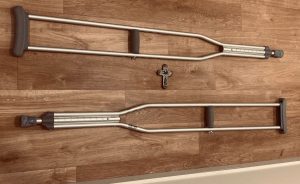
What I Learned About Prayer After A Week On Crutches
Bryan connects prayer to his recent injury.
WP_Post Object
(
[ID] => 1560
[post_author] => 4
[post_date] => 2019-10-17 18:04:38
[post_date_gmt] => 2019-10-17 18:04:38
[post_content] => <!-- wp:paragraph {"className":""} -->
<p class="">Patience is something I’ve struggled with my whole life. It seems to stem from a gap between what I <em>think</em> should happen, and the way life / others / God is. I’d love to share some thoughts and experiences I’ve had in being patient with others, God, and myself. <br></p>
<!-- /wp:paragraph -->
<!-- wp:heading {"level":4,"className":""} -->
<h4 class="">Patience with others<br></h4>
<!-- /wp:heading -->
<!-- wp:paragraph {"className":""} -->
<p class="">For most of my life, I liked to do things quickly. I tend to talk quickly, think quickly, get out the door quickly. Then God gave me the best husband, who takes his time to think before speaking, tends to leave things for the last minute, never seems to be in a rush. And who is the most patient person I have ever met.<br></p>
<!-- /wp:paragraph -->
<!-- wp:paragraph {"className":""} -->
<p class="">It drove me crazy for a while. I tried getting him to change, but soon realized that there was beauty in the way he approached each day, and that I needed to grow. So I started breathing and praying every time I felt myself getting impatient. After a while, I stopped getting so antsy. I became more comfortable with quiet, with taking my time, with actually thinking before I spoke. And as I found peace in slowing down, I became more patient with everyone around me. <br></p>
<!-- /wp:paragraph -->
<!-- wp:heading {"level":4,"className":""} -->
<h4 class="">Patience with God<br></h4>
<!-- /wp:heading -->
<!-- wp:paragraph {"className":""} -->
<p class="">This one is a tough one for me. It’s hard to see what God is doing when things fall apart, when hearts are broken, when the world is so full of hate.<br></p>
<!-- /wp:paragraph -->
<!-- wp:paragraph {"className":""} -->
<p class="">I could give you platitudes here - God’s timing is different from ours. We don’t understand why suffering happens. God is close to the brokenhearted. And all these are true, but they often don’t feel like enough.<br></p>
<!-- /wp:paragraph -->
<!-- wp:paragraph {"className":""} -->
<p class="">Here, I love to look at the saints. There are thousands of people who waited on God in the midst of suffering and uncertainty. People whose prayers were never answered in the way they hoped, people who desired one way of life but God led them down another. I think of Mother Teresa, who felt far from God for 40 years as she served those around her. Or St. Mark Ji Tianxiang who wanted so badly to break free of his opium addiction, but was never able to - but he continued to love God through his illness and died a martyr. Both of them must have asked God where he was, asked him how he could let this suffering continue. <br></p>
<!-- /wp:paragraph -->
<!-- wp:paragraph {"className":""} -->
<p class="">We are not the first people to wait for God to reveal His plans, or to heal us, or to give us some sign -- and we won’t be the last. So, whenever I feel overwhelmed wondering where God is, I take a look at people who have walked this road ahead of me. They remind me that though God doesn’t alleviate all suffering, he does join us in it. That though God might not answer our prayers in the way we wanted, we are invited to know and love the creator of the universe, and that’s pretty incredible. We will never fully understand God, but we do know that his way of loving others makes life worth living. <br></p>
<!-- /wp:paragraph -->
<!-- wp:heading {"level":4,"className":""} -->
<h4 class="">Patience with ourselves<br></h4>
<!-- /wp:heading -->
<!-- wp:paragraph {"className":""} -->
<p class="">St. Francis de Sales wrote, “Have patience with all things, but chiefly have patience with yourself. Do not lose courage in considering your own imperfections, but instantly set about remedying them -- every day begin the task anew.”<br></p>
<!-- /wp:paragraph -->
<!-- wp:paragraph {"className":""} -->
<p class="">I’ve gone to confession full of nerves that God is mad at me and I don’t deserve forgiveness. And multiple times I have had the priest say to me: “Stop being so hard on yourself. God loves you. He is so, so glad you are here.” <br></p>
<!-- /wp:paragraph -->
<!-- wp:paragraph {"className":""} -->
<p class="">If we could only see ourselves as God sees us, we would never believe lies like “I’m not enough” or, “I’m not worthy of love.” God desires for us to be patient in the slow work of becoming more like Jesus: to be kind to ourselves, to trust in his mercy, and to never believe we are too far lost for him to find us. <br></p>
<!-- /wp:paragraph -->
<!-- wp:paragraph {"className":""} -->
<p class="">So, maybe you are struggling to be patient with others - maybe one person in particular. Maybe you are growing impatient with God and wishing he would answer your prayers asap. Or maybe you are frustrated in yourself because you just can’t let go of the bad habits in your life. I’m going to say this to you in case you need to hear it (I know I need to hear it everyday) — “Stop being so hard on yourself. God loves you. He is so, so glad you are here.” </p>
<!-- /wp:paragraph -->
[post_title] => Problems with Patience
[post_excerpt] => Struggling with patience? You aren't alone.
[post_status] => publish
[comment_status] => closed
[ping_status] => closed
[post_password] =>
[post_name] => patience
[to_ping] =>
[pinged] =>
[post_modified] => 2024-02-13 21:05:33
[post_modified_gmt] => 2024-02-13 21:05:33
[post_content_filtered] =>
[post_parent] => 0
[guid] => https://hallow.com/?p=1560
[menu_order] => 0
[post_type] => post
[post_mime_type] =>
[comment_count] => 0
[filter] => raw
)

Problems with Patience
Struggling with patience? You aren't alone.
WP_Post Object
(
[ID] => 1518
[post_author] => 10
[post_date] => 2019-10-09 03:33:09
[post_date_gmt] => 2019-10-09 03:33:09
[post_content] => <!-- wp:paragraph {"align":"left","className":""} -->
<p class="has-text-align-left">I was 23 years old, working as a financial representative at a Fortune 100 company, at a conference in downtown Chicago. This was everything I thought I wanted, but something didn’t feel right. I thought of my accomplishments so far, about the opportunity I had at this conference to rub shoulders with top reps and execs, and to learn great things about the industry. I thought I should be happy because of all the external factors, but they couldn’t resolve the unease inside. I went for a run in the hopes of clearing my head. My hotel had a gym on the 43rd floor, overlooking the Chicago skyline and Lake Michigan. It was late, around 11pm; I was the only one there. Again, I should have been happy just looking around at where I was and what I had done to get there…but there was no peace. There was no one to share my success with. </p>
<!-- /wp:paragraph -->
<!-- wp:paragraph {"className":""} -->
<p class="">The past year and a half I had neglected friendships and family, working from 8am-10pm. Ironically, I was rarely alone; meetings with clients took up much of my day, but I was focused on the business opportunity, not the person. I was at a point where I didn’t feel connected to anyone. In a city of 2 million…I was alone. That realization stopped me cold. I couldn’t run, I didn’t have the heart to. If I was miserable after working so hard the past year, why keep going?</p>
<!-- /wp:paragraph -->
<!-- wp:paragraph {"className":""} -->
<p class="">After that, I didn’t feel like I could enjoy the energy and excitement of the conference. I looked up nearby churches to find a quiet spot to get away. There was one, St. Peter’s in the Loop that had 5:30am mass, early enough for me to get back to the day’s events. My phone failed to charge that night, and without it, I attempted to find the church by memory. I wandered around downtown for an hour. I was as lost literally as I was in my soul. Finally, I found the church just before mass. I prayed asking God for help in finding peace. When mass wrapped up, I still felt fairly miserable. </p>
<!-- /wp:paragraph -->
<!-- wp:paragraph {"className":""} -->
<p class="">Then the gentleman behind me
introduced himself: “Excuse me, I’m John.”
</p>
<!-- /wp:paragraph -->
<!-- wp:paragraph {"className":""} -->
<p class="">“Oh hi, I’m Stephen.” I wasn’t interested in talking. “Nice to meet you Stephen. I know we just met, but I felt called in mass to invite you to breakfast, would you be interested?” I threw out some objections about wanting to be alone, which is ironic considering I was upset about being alone. Sometimes we are our own worst enemy. I reluctantly agreed to breakfast. </p>
<!-- /wp:paragraph -->
<!-- wp:paragraph {"className":""} -->
<p class="">As we walked back to John’s hotel for breakfast, I learned a few things: he was from Florida, he had a wife and kids, and he was in Chicago for an engineering conference. We shared breakfast, talked about faith and work, then went our separate ways. One thing became clear as we ate; he missed his family. At the time that didn’t seem significant to me, but upon later reflection it hit me: I was alone and tried to resolve it by remaining alone. It didn’t work. John was alone and resolved it by reaching out to someone else, by caring for someone else. His approach seemed to work better for both of us. We left that breakfast meeting not feeling as alone. I believe God moved John’s heart to reach out to me to teach me a lesson. </p>
<!-- /wp:paragraph -->
<!-- wp:paragraph {"className":""} -->
<p class="">We all have hurt. For myself and John it was loneliness, but it can look different for each of us. We can choose to stay inside ourselves and keep the pain there. I tried that, and it didn’t work. We can try to distract ourselves from the hurt by exterior things like money, success, prestige…I also found that ineffective. </p>
<!-- /wp:paragraph -->
<!-- wp:paragraph {"className":""} -->
<p class="">There is another option. We can live with an open heart. We can recognize that others may be hurting just as much as us, and we can reach out. This is what Christ did on the cross, taking on our wounds in order to heal our wounds. We can strive to be the person for someone else that we need ourselves. By doing so, we can bring about healing. If we live with closed hearts, we all fail. When we live with open hearts, we can bring healing and positive change to our broken world. </p>
<!-- /wp:paragraph -->
<!-- wp:paragraph {"className":""} -->
<p class="">Stephen Tony is a Catholic Speaker, you can find out more about his work by visiting his site <a href="https://www.stephentonytalks.com/">here</a>. </p>
<!-- /wp:paragraph -->
[post_title] => When No One Cares, Be the One Who Does
[post_excerpt] => Stephan shares how loneliness changed his perspective.
[post_status] => publish
[comment_status] => open
[ping_status] => open
[post_password] =>
[post_name] => when-no-one-cares-be-the-one-who-does
[to_ping] =>
[pinged] =>
[post_modified] => 2020-10-05 17:26:47
[post_modified_gmt] => 2020-10-05 17:26:47
[post_content_filtered] =>
[post_parent] => 0
[guid] => https://hallow.com/?p=1518
[menu_order] => 0
[post_type] => post
[post_mime_type] =>
[comment_count] => 0
[filter] => raw
)
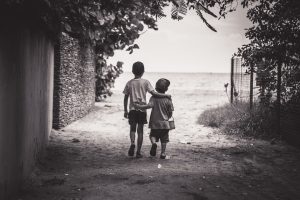
When No One Cares, Be the One Who Does
Stephan shares how loneliness changed his perspective.
WP_Post Object
(
[ID] => 1298
[post_author] => 6
[post_date] => 2019-08-29 03:06:10
[post_date_gmt] => 2019-08-29 03:06:10
[post_content] => <!-- wp:paragraph {"className":""} -->
<p class="">Welcome to our first issue of the Hallow Spotlight! Our goal is to shine the light on some of the cool stuff one of our Hallowers is doing around the world. In this post we focus on the <em>Camino de Santiago de Compostela</em>, or “The Way of St. James” which is a historic and spiritual pilgrimage in which <em>peregrinos</em>, or pilgrims, make their way to the Cathedral of St. James in Compostela where the remains of Jesus’ apostle James are believed to have been found. In its early history, the pilgrimage began by walking out your own front door, which is one reason multiple routes to the Cathedral exist today. Anyone who documents the most western 100km (by foot) or 200km (by bike) can collect the official credential proving completion of the journey, so many pilgrims choose to stick to the last week of the route or break the entire journey down into several smaller portions over the years. <br></p>
<!-- /wp:paragraph -->
<!-- wp:paragraph {"className":""} -->
<p class="">We asked a recent pilgrim about her experience walking the Camino. See her reflection on the Camino below:<br></p>
<!-- /wp:paragraph -->
<!-- wp:paragraph {"className":""} -->
<p class="">---<br></p>
<!-- /wp:paragraph -->
<!-- wp:paragraph {"className":""} -->
<p class=""><strong>How long were you walking each day?</strong></p>
<!-- /wp:paragraph -->
<!-- wp:paragraph {"className":""} -->
<p class="">I was following one of the more popular routes, the <em>Camino Frances</em>, which begins in St. Jean Pied-de-Port, France and takes a little over a month to complete. I had a 31-day itinerary so I knew where I needed to stop each day and the distance ranged from 14km to 37km. Usually I'd leave by 6:30 and finish anywhere between 12:30pm-3pm depending on the distance and the length of my breaks. <br></p>
<!-- /wp:paragraph -->
<!-- wp:paragraph {"className":""} -->
<p class=""><strong>How important was the religious pilgrimage aspect to you? </strong></p>
<!-- /wp:paragraph -->
<!-- wp:paragraph {"className":""} -->
<p class="">I first learned about the Camino in my high school theology class and made a mental note that I wanted to do it "someday". The more I grew to love travel, hiking, and challenging myself to push beyond the comfort zone, the more the Camino came back into my mind as something I really needed to do. I decided early on that I was not going to make an extensive list of all the things I wanted to see along the way because I knew there were so many churches and such that it would be tempting and potentially stressful to try and check things off a list. I guess you could say that by not focusing on the churches and shrines too much I was not paying due attention to the religious aspect of it. However, I saw it as a chance to be more spontaneous and open to letting the experience unfold however God willed it unfold. Since I'm usually a big planner, this was actually a meaningful way to approach the pilgrimage in my eyes. <br></p>
<!-- /wp:paragraph -->
<!-- wp:paragraph {"className":""} -->
<p class=""><strong>Was everyone who walked Catholic?</strong> </p>
<!-- /wp:paragraph -->
<!-- wp:paragraph {"className":""} -->
<p class="">Not at all. This was something that surprised me a lot actually. I kept reading that "you don't have to be Catholic to do the Camino", but I figured Catholic pilgrims would still make up a majority of the people. Instead, I feel like it was special to meet someone who was walking with the intention of praying and going to mass along the way. I met such a wide variety of people who were Buddhist, Agnostic, Unitarian, other Christian denominations, etc… but I also got to meet some really cool Catholic people. It was kind of nice to have someone Catholic to go to mass with one day and then the next day be challenged by a non-Catholic to explain some aspect of the faith. </p>
<!-- /wp:paragraph -->
<!-- wp:paragraph {"className":""} -->
<p class="">I certainly think it's a powerful experience and a deeply spiritual one no matter your faith background or where you're at in that faith. With so much time to think, opportunities to dig deep when it gets hard, or just the breathtaking views - you will take something meaningful from the experience of you're open to it being moved. <br></p>
<!-- /wp:paragraph -->
<!-- wp:paragraph {"className":""} -->
<p class=""><strong>What is one of the biggest takeaways from your Camino experience?</strong> </p>
<!-- /wp:paragraph -->
<!-- wp:paragraph {"className":""} -->
<p class="">I couldn't escape reflecting on the Camino as a metaphor for life. Ultimately I took away just a fresh and peaceful perspective on life. I think it comes from feeling like I lived through so many of the ups and downs of life in the span of 31 days, that I can walk away feeling like I've seen the big picture. Sometimes we're so deep in what's happening this week/month/year that it's hard to step back. The Camino, however was the ultimate chance to do that, for me anyways. I also got a lot of practice "following the yellow arrows" which for me translated into "looking for God's signs" in my life. I feel like I see Him everywhere now, but I admit I'm still working on how to interpret what he's saying. <br></p>
<!-- /wp:paragraph -->
<!-- wp:paragraph {"className":""} -->
<p class=""><strong>What was your favorite part of the experience?</strong></p>
<!-- /wp:paragraph -->
<!-- wp:paragraph {"className":""} -->
<p class="">It's really hard to say. I mostly loved having time and space to breathe. To escape the weight of anxiety and have nothing to worry about except getting to that day's destination. Some of the views were just spectacular and I've always loved hiking for that. Also, the 1€ wine and cheap food was amazing. Coming from DC where eating out is so expensive, I really enjoyed being able to treat myself and still only spend 30€ a day. <br></p>
<!-- /wp:paragraph -->
<!-- wp:paragraph {"className":""} -->
<p class=""><strong>What was your least-favorite part?</strong></p>
<!-- /wp:paragraph -->
<!-- wp:paragraph {"className":""} -->
<p class="">I hated the blisters! But also, sleeping in the big albergues (hostels) was an adventure, but not necessarily the most comfortable. It was also unfortunate that no matter how much I tried to relax, I was always a little anxious about getting a bed each night. I think if I had the time to take each day as it comes and wasn't following an itinerary then it would be different. I imagined that you could just walk into town and find a bed (which for the most part you could) but there was always a little worry that I'd be out of luck and I hated that feeling. Trusting God a little more is clearly something I could work on improving.<br></p>
<!-- /wp:paragraph -->
<!-- wp:paragraph {"className":""} -->
<p class="">----<br></p>
<!-- /wp:paragraph -->
<!-- wp:paragraph {"className":""} -->
<p class="">Thank you for sharing your experience with us, Erin! <br></p>
<!-- /wp:paragraph -->
[post_title] => Hallow Spotlight: A Spiritual Journey on the Camino
[post_excerpt] => Erin reflects on walking the Camino.
[post_status] => publish
[comment_status] => closed
[ping_status] => open
[post_password] =>
[post_name] => hallow-spotlight-a-spiritual-journey-on-the-camino
[to_ping] =>
[pinged] =>
[post_modified] => 2024-02-13 21:02:38
[post_modified_gmt] => 2024-02-13 21:02:38
[post_content_filtered] =>
[post_parent] => 0
[guid] => https://hallow.com/?p=1298
[menu_order] => 0
[post_type] => post
[post_mime_type] =>
[comment_count] => 0
[filter] => raw
)

Hallow Spotlight: A Spiritual Journey on the Camino
Erin reflects on walking the Camino.
WP_Post Object
(
[ID] => 1173
[post_author] => 7
[post_date] => 2019-08-05 19:32:12
[post_date_gmt] => 2019-08-05 19:32:12
[post_content] => <!-- wp:paragraph {"className":""} -->
<p class=""><br></p>
<!-- /wp:paragraph -->
<!-- wp:paragraph {"className":""} -->
<p class="">I don't know about you, but I get the
greatest ideas at the most inconvenient times. For me, they usually come either
right as I am trying to fall asleep or while I am trying to listen to a homily
during mass.</p>
<!-- /wp:paragraph -->
<!-- wp:paragraph {"className":""} -->
<p class="">For the past few years, I have been
baffled by these consistently ill-timed, fleeting glimmers of inspiration.
Whether it's something that really needs to get done at work, an item I need to
add to my grocery list, or a random idea for a new blog post, it is always so
frustrating that none of these "brilliant ideas" come to me while I
am sitting at my desk with pen and paper in hand, explicitly trying to remember
what I need to do. </p>
<!-- /wp:paragraph -->
<!-- wp:paragraph {"className":""} -->
<p class="">One solution initially seemed relatively
easy and obvious to me - to simply keep a notepad on my nightstand when I go to
bed and in my pocket when I go to mass. That way, I would be ready whenever the
ideas decided to show up. </p>
<!-- /wp:paragraph -->
<!-- wp:paragraph {"className":""} -->
<p class="">But then the strangest thing would keep
happening. Even after I took the jump and finally bought a pocket-sized
notepad, no matter how hard I tried, I could never bring myself to actually
bring it to mass or keep it next to my bed. I now have at least 3 notepads in
the drawers of the desk next to my bed, but I still lay awake at night with a
mind teeming with random, perpetually uncompleted to-do's. </p>
<!-- /wp:paragraph -->
<!-- wp:paragraph {"className":""} -->
<p class="">For the longest time, I just couldn't figure out what was wrong with me. I had a seemingly benign, but annoying problem and an overwhelmingly simple solution staring me in the face, but I just couldn't bring myself to put the two together.</p>
<!-- /wp:paragraph -->
<!-- wp:paragraph {"className":""} -->
<p class="">Then I went the SEEK conference in Indianapolis this past January and after our scheduled Theology on Tap speaker had some travel complications, Fr. Mike Schmitz graciously jumped in at the last minute to gave an impromptu, hour-long speech (NBD). It was, in part, about desert monks and was the most unexpectedly relatable story I had ever heard Fr. Mike tell (which, for those of you that don't know <a href="https://www.youtube.com/playlist?list=PLeXS0cAkuTPpJ6j3eH59WudJhJ4q1tpwH">Fr. Mike</a>, is saying something). </p>
<!-- /wp:paragraph -->
<!-- wp:paragraph {"className":""} -->
<p class="">As you might expect, desert monks (in
this case the desert fathers and mothers from the first few centuries AD) live
in the desert and pray a lot, but what you might not expect is that even most
learned monks struggle with very relatable temptations. </p>
<!-- /wp:paragraph -->
<!-- wp:paragraph {"className":""} -->
<p class="">Lust, greed, pride… you name, they face
it. One day, one of the head monks (unofficial title) was reflecting on the
struggles of his group and in his reflections, he noted that even though each
one of the monks wrestled with different sins, there wasn't a single sin that
was a challenge for all of the monks.</p>
<!-- /wp:paragraph -->
<!-- wp:paragraph {"className":""} -->
<p class="">Except one - the deadly sin of Acedia. </p>
<!-- /wp:paragraph -->
<!-- wp:paragraph {"className":""} -->
<p class="">Acedia was the single sin that was a
consistent stumbling block for each and every one of the monks, from the
youngest to the oldest.</p>
<!-- /wp:paragraph -->
<!-- wp:paragraph {"className":""} -->
<p class="">You might be more familiar with modern
English transition, "Sloth," but since sloth's official pronunciation
apparently isn't the same as the lovable Australian mammal, Fr. Mike prefers to
just stick with Acedia. Fair enough. </p>
<!-- /wp:paragraph -->
<!-- wp:paragraph {"className":""} -->
<p class="">So what exactly is sloth and why is it
so prevalent? </p>
<!-- /wp:paragraph -->
<!-- wp:paragraph {"className":""} -->
<p class="">I had always thought of sloth as
laziness and that it was bad because God calls us to go out to do great things
in the world. According to my thinking, sitting around and doing nothing must
be bad, because we could and should be out doing better things: feeding the
poor, helping the sick, spreading the gospel, etc. Well that's true, but what I
learned in Fr. Mike's speech is that sloth is specifically not laziness. </p>
<!-- /wp:paragraph -->
<!-- wp:paragraph {"className":""} -->
<p class="">The sin of sloth is actually the act of
saying no to God's presence in the present moment. In Fr. Mike's words,
"it's wanting to doing anything other than what we are called to be doing
in that moment."</p>
<!-- /wp:paragraph -->
<!-- wp:paragraph {"className":""} -->
<p class="">Ok…sounds basically like
procrastination. So why is it on the list of the 7 deadly sins? How could it
possibly be that bad? Well, it's deadly because it cuts us off from the only
way we have of receiving God's grace, by loving Him and surrendering our will
to His in the here and now.</p>
<!-- /wp:paragraph -->
<!-- wp:paragraph {"className":""} -->
<p class="">Unlike God, who operates outside of and
beyond time, we humans operate in a physical universe and must navigate the
eternal passage of future to past. No matter how hard we try, we can't go
backward in time and we can't jump ahead (notable exceptions: Marty McFly and Tony
Stark). </p>
<!-- /wp:paragraph -->
<!-- wp:paragraph {"className":""} -->
<p class="">We live, love, suffer and die in the
eternal present, that ever-evaporating fraction of a second within which we can
affect the world. </p>
<!-- /wp:paragraph -->
<!-- wp:paragraph {"className":""} -->
<p class="">And it's in each one of those
infinitesimal seconds that God is reaching out to us, inviting us to love him.
Not yesterday, not tomorrow, but now. Each and every now, from this moment to
our last. </p>
<!-- /wp:paragraph -->
<!-- wp:paragraph {"className":""} -->
<p class="">Acedia then, is the act of allowing our minds to wander from the inviting embrace of Christ, to a selfish fixation on either inward thinking (i.e., saying we would rather focus on ourselves than on God) or the non-present (i.e., saying we would rather think about the past or future instead of being with God in the present). In the words of St. Thomas Aquinas it is, "<a href="http://www.newadvent.org/summa/3035.htm">sluggishness of the mind which neglects to begin good</a>."</p>
<!-- /wp:paragraph -->
<!-- wp:paragraph {"className":""} -->
<p class="">In the morning, most of the desert monks
had the support of their routine to maintain focus on God's grace in their
lives. Their work was productive and they lived with inspiration that they have
the whole day ahead of them. In the evening, their meals and their prayers in
preparation of sleep brought consolation and a time for conscious reflection.
But during the middle of the day, from ~10am-2pm, they were alone in their
huts, with the sun high and motionless in the sky, equally far from the
optimistic dreams of the morning and the safe harbor of the evening. It was
then that they faced the "noonday devil," the challenge of maintaining
focus on being with the Lord in prayer and not giving into the temptation of a
wandering mind.</p>
<!-- /wp:paragraph -->
<!-- wp:paragraph {"className":""} -->
<p class="">Hearing that story, I finally realized
that my ongoing struggle with unfortunately timed inspiration was actually a
targeted and persistent assault by the devil on my soul.</p>
<!-- /wp:paragraph -->
<!-- wp:paragraph {"className":""} -->
<p class="">Overdramatic? Maybe a little, but not by
much. </p>
<!-- /wp:paragraph -->
<!-- wp:paragraph {"className":""} -->
<p class="">Much like the monks, I have a morning
routine of prayer and reading that keeps me relatively focused, but once I
start my day, it's usually a never-ending onslaught of emails, calls, social
media, news, and texts. For me, "multitasking" is basically just a
euphemism for trying to juggle a bunch of balls without letting the mounting
anxiety become totally crippling.</p>
<!-- /wp:paragraph -->
<!-- wp:paragraph {"className":""} -->
<p class="">So by the time I go to mass, either on
Sunday or at midday during the week, I am hungry for and in need of some grace
to help lighten the load. I start to get in the zone during the opening song,
the readings being to reorient my soul back to God's will and by the time the
homily starts, I'm ready to extend a "yes" to Christ…then BOOM. </p>
<!-- /wp:paragraph -->
<!-- wp:paragraph {"className":""} -->
<p class="">"Wouldn't it be great if I just
spent a few hours tonight cleaning out those random 100 emails I have hanging
around in my inbox from the last few months? Yea, that would be great. I
remember that time I had a clean inbox. It felt awesome; almost as good as the
end of senior year in college when I didn't have any real responsibilities.
Man, I miss those days. … wow, wait, what's happening? Time for the creed
already? What did the priest say?"</p>
<!-- /wp:paragraph -->
<!-- wp:paragraph {"className":""} -->
<p class="">All it took was a little distraction, a
little nudge in the direction of falling back into the pit of anxiety that
comes with a never-ending to-do list, and I missed the message of meaning that
the priest had offered the congregation. </p>
<!-- /wp:paragraph -->
<!-- wp:paragraph {"className":""} -->
<p class="">The same thing happens at night. As I
get geared up to pray right before I got to bed, I have the opportunity to
benefit from a good Examen or to spend some time praying for friends and
family, but instead, that small seed of temptation to focus instead on the
unaccomplished part of my to-do list grows into full-blown feelings of despair
about lifelong failures. </p>
<!-- /wp:paragraph -->
<!-- wp:paragraph {"className":""} -->
<p class="">I've come to realize that it's in these moments where I have the opportunity for the largest graces, that the devil focuses his attention on trying to shift my gaze away from Christ. A simple shift to look instead to the past, the future, or inwardly toward myself, and I miss out on the true joy and peace of communion with God. </p>
<!-- /wp:paragraph -->
<!-- wp:paragraph {"className":""} -->
<p class="">Which brings us (finally) to the point
of this increasingly long blog post: how we can conquer our tendency toward
sloth by striving to pray without ceasing.</p>
<!-- /wp:paragraph -->
<!-- wp:paragraph {"className":""} -->
<p class="">While it may sound daunting to literally pray ALL of the time, thankfully the Church has given us a very simple blueprint in scripture, "Rejoice always. Pray without ceasing. In all circumstances give thanks, for this is the will of God for you in Christ Jesus" (1 Thess. 5:16-18). </p>
<!-- /wp:paragraph -->
<!-- wp:paragraph {"className":""} -->
<p class="">Give thanks. That's what it all comes down to. </p>
<!-- /wp:paragraph -->
<!-- wp:paragraph {"className":""} -->
<p class=""><strong>RELATED: </strong><a href="https://hallow.com/blog/prayers-for-anxiety/">Prayers for Anxiety</a></p>
<!-- /wp:paragraph -->
<!-- wp:paragraph {"className":""} -->
<p class="">At all times for all things, we can give
thanks to God and surrender ourselves to the idea that in every moment we are
where He wants us to be. It won't always be easy and it won't always work out
the way we want it to, but He will absolutely be with us.</p>
<!-- /wp:paragraph -->
<!-- wp:paragraph {"className":""} -->
<p class="">By rejoicing and giving thanks for each second we are offered here on earth, we create what Fr. Jean-Pierre de Caussade calls the "<a href="https://books.google.com/books?id=UZxUDwAAQBAJ&pg=PA162&lpg=PA162&dq=Fr.+Jean-Pierre+de+Caussade++the+%22miracle+of+the+present+moment.%22&source=bl&ots=3RSJFhucS6&sig=ACfU3U0WjvOpsk2KvwpRMuUQGDkoPQg4vQ&hl=en&sa=X&ved=2ahUKEwiJ-uGx0O7jAhUiyVQKHeDBCucQ6AEwBXoECAIQAQ#v=onepage&q=Fr.%20Jean-Pierre%20de%20Caussade%20%20the%20%22miracle%20of%20the%20present%20moment.%22&f=false">miracle of the present moment</a>." In so doing, we disarm the devil's ability to distract us with thoughts of things we wish we could have done differently or of things we haven't yet been able to do.</p>
<!-- /wp:paragraph -->
<!-- wp:paragraph {"className":""} -->
<p class="">Whether it's giving thanks for a freshly
grilled steak and cold beer as a moment of beauty made miraculous by its
offering up to Christ (as Fr. Mike loves to talk about) or experiencing the
pain of losing a loved one as moment surrender to His grace, embracing God's
presence in every minute of our lives is the key to everlasting joy. </p>
<!-- /wp:paragraph -->
<!-- wp:paragraph {"className":""} -->
<p class="">"Tomorrow is uncertain. Yesterday
no longer belongs to you, only the present is yours"</p>
<!-- /wp:paragraph -->
<!-- wp:paragraph {"className":""} -->
<p class="">- St. Maximilian Kolbe</p>
<!-- /wp:paragraph -->
<!-- wp:paragraph {"className":""} -->
<p class=""></p>
<!-- /wp:paragraph -->
[post_title] => How Prayer Helped Me With My To-Do List Anxiety
[post_excerpt] => Alessandro reflects on prayer, sloth, and living in the moment.
[post_status] => publish
[comment_status] => open
[ping_status] => open
[post_password] =>
[post_name] => how-prayer-helped-me-with-my-to-do-list-anxiety%ef%bb%bf
[to_ping] =>
[pinged] =>
https://hallow.com/2021/07/16/prayers-for-anxiety/
[post_modified] => 2022-09-13 23:48:16
[post_modified_gmt] => 2022-09-13 23:48:16
[post_content_filtered] =>
[post_parent] => 0
[guid] => https://hallow.com/?p=1173
[menu_order] => 0
[post_type] => post
[post_mime_type] =>
[comment_count] => 0
[filter] => raw
)

How Prayer Helped Me With My To-Do List Anxiety
Alessandro reflects on prayer, sloth, and living in the moment.
WP_Post Object
(
[ID] => 1144
[post_author] => 7
[post_date] => 2019-07-30 22:59:20
[post_date_gmt] => 2019-07-30 22:59:20
[post_content] => <!-- wp:paragraph {"className":""} -->
<p class="">Members of the Hallow team and I recently attended a talk by Kevin Kelly, co-founder of the <em>Wired</em> magazine, titled “The Future of Spirituality and Technology.” The hour-long discussion was fascinating and covered a wide range of topics, starting with humans creating stone tools and progressing to our current pursuit of building an artificial intelligence (“AI”).</p>
<!-- /wp:paragraph -->
<!-- wp:paragraph {"className":""} -->
<p class="">Looking around today’s technology ecosystem, there is plenty of buzz surrounding new, world-changing technologies: blockchain, quantum computing, and nanotechnology, but it seems like AI falls in a totally different category.</p>
<!-- /wp:paragraph -->
<!-- wp:paragraph {"className":""} -->
<p class="">Rather than focusing on productive potential, the conversation around AI almost always quickly becomes a discussion on ethical dilemmas and existential threat.</p>
<!-- /wp:paragraph -->
<!-- wp:paragraph {"className":""} -->
<p class="">As far as I can tell there are two main (and related) reasons why we are <em>afraid</em> of AI. The first is that AI is inherently uncontrollable. The second is that it could reject and try to destroy us.</p>
<!-- /wp:paragraph -->
<!-- wp:paragraph {"className":""} -->
<p class="">By reflecting on these fears, I realized that developing artificial intelligences can offer incredible insight into our own nature as spiritual intelligences (SIs), created by God.</p>
<!-- /wp:paragraph -->
<!-- wp:paragraph {"className":""} -->
<p class=""><strong>Uncontrollable</strong> – Think about how many hard decisions we face every time we drive our cars. Someone pulls out in front of us and we are going to fast to stop - and there is also another car coming in the opposite direction, so we can’t swerve out of the way. What should we do?</p>
<!-- /wp:paragraph -->
<!-- wp:paragraph {"className":""} -->
<p class="">Even if we as humans could figure out what the ethically “right” choice is, how do we teach it to self-driving cars that “think” for themselves?</p>
<!-- /wp:paragraph -->
<!-- wp:paragraph {"className":""} -->
<p class=""><strong>Rejection</strong> – Whether you have a PhD in neural nets or just have a general awareness of the Terminator movies, you have probably seen a headline alluding to some doomsday scenario caused by AI.</p>
<!-- /wp:paragraph -->
<!-- wp:paragraph {"className":""} -->
<p class="">The general logic goes something like this: a powerful enough AI could decide that we puny humans are simply inefficient (or worse - that we make the universe worse off through dishonesty, crime, and war) and that it’s time for Homo Sapiens to pass into the history of evolution like the Neanderthals before us.</p>
<!-- /wp:paragraph -->
<!-- wp:paragraph {"className":""} -->
<p class=""><strong>So...</strong></p>
<!-- /wp:paragraph -->
<!-- wp:paragraph {"className":""} -->
<p class="">The real issue that we are grappling with is how to deal with creating something that is uncontrollable and that could reject us as either inefficient or evil.</p>
<!-- /wp:paragraph -->
<!-- wp:paragraph {"className":""} -->
<p class="">Sound like any other challenge in life?</p>
<!-- /wp:paragraph -->
<!-- wp:paragraph {"className":""} -->
<p class="">Forget about creating artificial intelligence, how about creating natural intelligence? How about raising children?</p>
<!-- /wp:paragraph -->
<!-- wp:paragraph {"className":""} -->
<p class="">No matter how tight of a ship parents run, I’m not sure that a single parent in the world would ever make the claim that they can actually <em>control</em> their kids.</p>
<!-- /wp:paragraph -->
<!-- wp:paragraph {"className":""} -->
<p class="">Parents do their best to teach their kids how to drive, but at some point the keys are going to be in the hands of the child, and they are going to need to be the ones who decide whether they are going to obey the speed limit.</p>
<!-- /wp:paragraph -->
<!-- wp:paragraph {"className":""} -->
<p class="">So how are we supposed to parent? And can that help us better contemplate our relationship with AI?</p>
<!-- /wp:paragraph -->
<!-- wp:paragraph {"className":""} -->
<p class=""><strong>Humans as children and as parents</strong></p>
<!-- /wp:paragraph -->
<!-- wp:paragraph {"className":""} -->
<p class="">One path forward might be to start not with HOW to parent, but WHY we are called to be parents in the first place. Why are we as humans designed to conceive as couples, bear children that are wholly incapable of taking care of themselves, and guide them into adulthood?</p>
<!-- /wp:paragraph -->
<!-- wp:paragraph {"className":""} -->
<p class="">I would contest that it’s because we are made in the image of a God who is relationship, love, creation, and sacrifice. Out of the Trinity, 3 persons in one spirit, we were created by Love and imbued with that same creative nature.</p>
<!-- /wp:paragraph -->
<!-- wp:paragraph {"className":""} -->
<p class="">But that’s not all...</p>
<!-- /wp:paragraph -->
<!-- wp:paragraph {"className":""} -->
<p class="">We weren’t abandoned at birth or made to serve our creator by force. We were given free will and even after we fell, God continued to lead us down the path of spiritual development, the whole way to salvation via His ultimate self-sacrifice on the cross.</p>
<!-- /wp:paragraph -->
<!-- wp:paragraph {"className":""} -->
<p class="">In parenting, we are called to do the same. We do our best to demonstrate an example of love and to teach our children the best ways we know how to live, but ultimately we know they will stumble, often in the same ways that we stumble.</p>
<!-- /wp:paragraph -->
<!-- wp:paragraph {"className":""} -->
<p class=""><strong>The real fear</strong></p>
<!-- /wp:paragraph -->
<!-- wp:paragraph {"className":""} -->
<p class="">Maybe the idea of artificial intelligence is scary for the same reason raising children is scary. Children are mirrors that force us to look at our true selves - how we actually live, not the idealized facades we try to project into the world. “Do as I say, not as I do” never works as a parenting strategy, because the human mind learns by mimicking the <em>actions</em> it observes in others, not just by listening to commands.</p>
<!-- /wp:paragraph -->
<!-- wp:paragraph {"className":""} -->
<p class="">Just like kids, AI systems “learn” from real world data. They look at a bunch of decisions that have been made, then they look at the outcomes, and by comparing the two, they “learn” relationships and principles that they can use to navigate future scenarios.</p>
<!-- /wp:paragraph -->
<!-- wp:paragraph {"className":""} -->
<p class="">Maybe we are scared of AI concluding we should become extinct, because we know that the “training data” that we have created in the world might not show the best we have to offer.</p>
<!-- /wp:paragraph -->
<!-- wp:paragraph {"className":""} -->
<p class=""><strong>The holy, parental heart</strong></p>
<!-- /wp:paragraph -->
<!-- wp:paragraph {"className":""} -->
<p class="">It is in this realization then (i.e., that AIs would be our creations in the same way that we are God’s created SIs) that we understand the true beauty and real danger of pursuing the creation of an artificial intelligence.</p>
<!-- /wp:paragraph -->
<!-- wp:paragraph {"className":""} -->
<p class="">The beauty – by reflecting on our freedom and our history, we see how much God has loved us. Despite how consistently we have fallen, He has continually set the example of a forgiving parent, even to the point of redeeming our sins on the cross.</p>
<!-- /wp:paragraph -->
<!-- wp:paragraph {"className":""} -->
<p class="">The danger – overlooking the fact that the example we set with how we live our lives may very well be determining the fate of our species. Unless we follow and set the example of Christ’s love in the world, both the natural and artificial intelligences we create will stumble in the same ways that we stumble.</p>
<!-- /wp:paragraph -->
<!-- wp:paragraph {"className":""} -->
<p class="">We will never be perfect, but what if we use this moment in human history as a chance to reflect on God's example as the ultimate parent - loving and sacrificing unconditionally? What if we lived every day trying to teach by example so that our AI could also work to make the world a better place?</p>
<!-- /wp:paragraph -->
<!-- wp:paragraph {"className":""} -->
<p class="">God bless,</p>
<!-- /wp:paragraph -->
<!-- wp:paragraph {"className":""} -->
<p class="">Alessandro</p>
<!-- /wp:paragraph -->
<!-- wp:paragraph {"className":""} -->
<p class="">“By their fruits you will know them” (Matt. 7:16)<br></p>
<!-- /wp:paragraph -->
[post_title] => Artificial Meets Spiritual Intelligence - How AI and Faith Can Make The World a Better Place
[post_excerpt] => Alessandro examines the intersection of AI and faith.
[post_status] => publish
[comment_status] => open
[ping_status] => open
[post_password] =>
[post_name] => artificial-meets-spiritual-intelligence-how-ai-and-faith-can-make-the-world-a-better-place
[to_ping] =>
[pinged] =>
[post_modified] => 2020-10-05 17:34:30
[post_modified_gmt] => 2020-10-05 17:34:30
[post_content_filtered] =>
[post_parent] => 0
[guid] => https://hallow.com/?p=1144
[menu_order] => 0
[post_type] => post
[post_mime_type] =>
[comment_count] => 0
[filter] => raw
)

Artificial Meets Spiritual Intelligence – How AI and Faith Can Make The World a Better Place
Alessandro examines the intersection of AI and faith.
WP_Post Object
(
[ID] => 1058
[post_author] => 3
[post_date] => 2019-07-14 21:25:28
[post_date_gmt] => 2019-07-14 21:25:28
[post_content] => <!-- wp:paragraph {"className":""} -->
<p class="">By Alex Jones</p>
<!-- /wp:paragraph -->
<!-- wp:paragraph {"className":""} -->
<p class="">The U.S. Catholic Church is dying. </p>
<!-- /wp:paragraph -->
<!-- wp:paragraph {"className":""} -->
<p class="">There were 426,309 Catholic weddings in 1970.
In 2018 there were 143,082. Priestly ordinations have fallen by over 35%. <a href="https://cara.georgetown.edu/frequently-requested-church-statistics/">Mass
attendance has been cut in half.</a> </p>
<!-- /wp:paragraph -->
<!-- wp:paragraph {"className":""} -->
<p class="">It's worst among millennials; they are the
least Catholic of any other generation. <a href="https://www.pewforum.org/religious-landscape-study/religious-tradition/unaffiliated-religious-nones/">One
out of every three young adults is religiously unaffiliated. The same ratio for
65+ is one in ten.</a> </p>
<!-- /wp:paragraph -->
<!-- wp:paragraph {"className":""} -->
<p class="">One study, called <a href="https://www.smp.org/product/5926/Going-Going-Gone/">"Going Going Gone,"</a> tried to figure out why, but they found there's no one answer. Some leave because they were hurt by the awful failings of the institution. Some reject a God who could permit evil. Some oppose the Church's stance on social issues. Some simply drift away into an increasingly secular culture. </p>
<!-- /wp:paragraph -->
<!-- wp:paragraph {"className":""} -->
<p class="">I was one of the unaffiliated, the former
Catholics. I was the millennial who turned atheist. And I came back. Ever
since, we’ve been working on Hallow and trying to understand how we can help
others come back to their faith. Our team has spent countless hours talking
with young and old, religious and atheist, spiritual and religious, about where
they are and what they need. The biggest thing we’ve learned:</p>
<!-- /wp:paragraph -->
<!-- wp:paragraph {"className":""} -->
<p class="">Religion is down. Spirituality is not.</p>
<!-- /wp:paragraph -->
<!-- wp:paragraph {"className":""} -->
<p class="">The percent of people who consider themselves
religious has fallen 17% since 2007. But this has not been swallowed up by
atheism and materialism. A new segment has emerged: "Spiritual but not
Religious.” <a href="https://www.pewresearch.org/fact-tank/2017/09/06/more-americans-now-say-theyre-spiritual-but-not-religious/">Of
the 11 point drop in Religious, 8 of those have been replaced by Spiritual.</a>
</p>
<!-- /wp:paragraph -->
<!-- wp:paragraph {"className":""} -->
<p class="">This was me. Lost. Stressed. New to a career.
No idea what I believed. For some reason, though, deeply interested in
spirituality. Avoiding institutional religion, I turned, instead, to
mindfulness. The practice of meditation that has swept across the U.S. with the
rise of Headspace and Calm offered a seemingly secular answer to spirituality. </p>
<!-- /wp:paragraph -->
<!-- wp:paragraph {"className":""} -->
<p class="">But this answer always felt like it fell
short, stopping just at the edge of true spirituality. Teaching me to sit in
silence, but never inviting God. And so, I started asking: is there a best of
both worlds? Is there a way to find stillness and God? What I found - Lectio
Divina, Ignatian spirituality, contemplative prayer, the spirituality of the
Church - changed my life. They finally led me to invite God into the silence.</p>
<!-- /wp:paragraph -->
<!-- wp:paragraph {"className":""} -->
<p class="">Remember those numbers about mass, weddings, and ordinations? Well there's one number that hasn't dropped: prayer. In 1980, 81% of Catholics prayed each week. In 2018: 81%. The thing is, we often don't know how to pray. In our user research, the number one thing people said they struggled with most when it comes to prayer was not that they were too busy, bored, or disagreed with Church teachings. It was because praying was too hard. We don't know how to keep our minds from racing. </p>
<!-- /wp:paragraph -->
<!-- wp:paragraph {"className":""} -->
<p class="">This is the need. And what a perfect need for
the Church to fill as an institution that's been teaching people to pray for
2,000 years.</p>
<!-- /wp:paragraph -->
<!-- wp:paragraph {"className":""} -->
<p class="">Over half of our users had never heard of
Lectio Divina, the Examen, Contemplative Prayer, Imaginative prayer, or any number
of different prayer practices. Why isn't this what we lead with? Instead of
focusing on why the Church is losing people or why people are no longer
interested in religion, why don’t we focus on what people <em>are </em>still
interested in? Why don’t we lead with our spirituality? Why don’t we lead with
teaching people first to talk, and more importantly, to listen to God? If we
honestly believe what we say we do, isn't God the best evangelizer?</p>
<!-- /wp:paragraph -->
<!-- wp:paragraph {"className":"","fontSize":"small"} -->
<p class="has-small-font-size">SOURCES: Center for Applied Research in the Apostolate; Pew Research Center</p>
<!-- /wp:paragraph -->
[post_title] => From a Millennial to the Church: How to Win Us Back
[post_excerpt] => What if we focused on prayer?
[post_status] => publish
[comment_status] => open
[ping_status] => open
[post_password] =>
[post_name] => from-a-millennial-to-the-church-how-to-win-us-back
[to_ping] =>
[pinged] =>
[post_modified] => 2020-10-05 17:36:01
[post_modified_gmt] => 2020-10-05 17:36:01
[post_content_filtered] =>
[post_parent] => 0
[guid] => https://hallow.com/?p=1058
[menu_order] => 0
[post_type] => post
[post_mime_type] =>
[comment_count] => 0
[filter] => raw
)

From a Millennial to the Church: How to Win Us Back
What if we focused on prayer?
